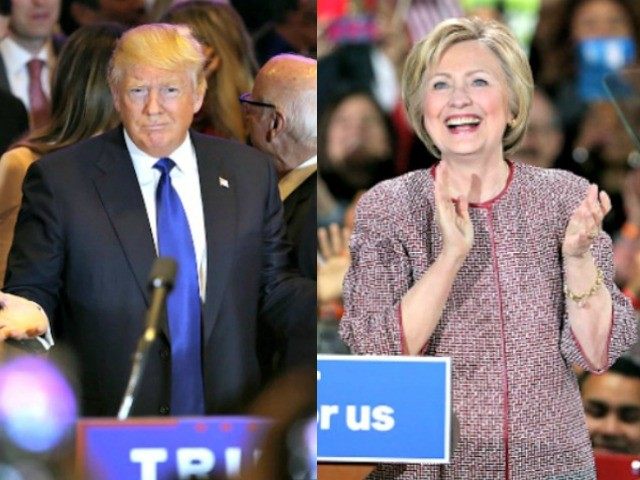New York primary voters delivered big results for both native son Donald Trump and political transplant Hillary Clinton.
Trump won the Republican primary with around 60 percent of the vote, more than enough to trigger winner-take-all rules for the state’s at-large delegates. Hillary Clinton likewise dominated the Democrat primary, winning almost 60 percent of the vote against Vermont Sen. Bernie Sanders.
Both frontrunners will try to leverage momentum from the lopsided wins to consolidate support in the remaining primaries. Both Trump and Clinton still face challenges in securing the majority of pledged delegates necessary to win the nomination before their parties’ conventions. The advantage they both have, however, is that, after the results in New York, no other candidate could capture a majority before the convention.
Trump’s large margin in the statewide contest means he is very likely to pick up almost all the delegates at stake in New York. The bulk of the Empire State’s delegates, 81, are awarded through the state’s 27 congressional districts. If a candidate wins a congressional district with more than 50 percent of the vote, that candidate wins all three delegates in each district.
Trump has won 18 districts by strong majorities, netting him all three delegates in each. He is winning, but well below the 50 percent threshold in four districts. In these districts he will collect two delegates each, while second-place John Kasich picks up one delegate in each. Another district, in Manhattan, is still too close to call between Trump and Kasich.
In the final four congressional districts, Trump is ahead and is currently just over the 50 percent threshold necessary to trigger winner-take-all delegate rules. It will probably be a day or two before the final count is determined.
In the end, Trump likely will win 90 of the 95 total delegates at stake. The outcome is a big win for Trump and gives him an outside chance of securing the minimum 1,237 delegates he needs to win the nomination on a first ballot at the convention.
Even this lopsided win, however, likely still keeps him a few dozen delegates short after all the primaries are finished on June 7.
The final contests in April are all in the Northeast or Mid-Atlantic regions, where Trump has performed very well. Next week, Maryland, Connecticut, Rhode Island, Delaware, and Pennsylvania vote and are expected to continue Trump’s string of victories.
The largest delegate prize next week, on April 26, is Pennsylvania. The winner of the statewide vote there receives 17 delegates, but another 54 delegates are elected in the state’s congressional districts. The delegates are officially unbound to any campaign. These delegates may very well hold the balance of power in Cleveland.
The primary contest then shifts to the Midwest and West where Trump’s main challenger, Ted Cruz, has performed well. The next pivotal contest is likely to be Indiana, which has a winner-take-most process for awarding its 57 delegates. Unlike New York and the Northeast, the state is a strong Republican state and has characteristics that play to the strenghts of all three candidates.
Trump’s victory in New York was expected. His performance, however, was better than expected and he netted almost all the delegates at stake. It hasn’t appreciably changed the direction of the race, though. The outcome of the Republican contest won’t be settled until the final day of voting, June 7, at the earliest. Even with his landslide win in New York, Trump will still need to win an overwhelming number of delegates on the final day of voting to secure the nomination.
The positive for Trump, though, is it gives his campaign a needed win after a big loss in Wisconsin and recent shortfalls in the hunt for delegates. It allows him to reboot his campaign.
On March 15, as Trump won Florida and dispatched Marco Rubio from the race, the frontrunner seemed on the cusp of consolidating Republican support behind him to win the nomination. A series of missteps in the immediate aftermath of that victory shattered a growing consensus behind his candidacy. Trump’s victory in New York, and expected victories next week, offer him another opportunity to begin unifying the party behind him.
He needs to seize that opportunity.

COMMENTS
Please let us know if you're having issues with commenting.